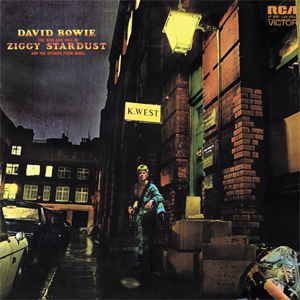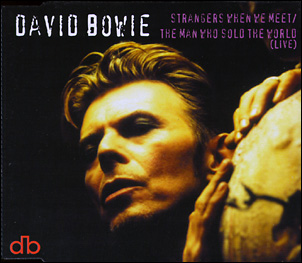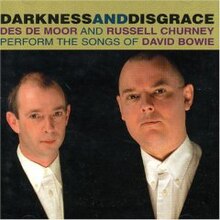
The Rise and Fall of Ziggy Stardust and the Spiders from Mars is the fifth studio album by English musician David Bowie, released on 16 June 1972 in the United Kingdom by RCA Records. It was produced by Bowie and Ken Scott and features Bowie's backing band the Spiders from Mars – Mick Ronson, Trevor Bolder and Mick Woodmansey. Most of the songs were written around the same time as its predecessor Hunky Dory. After that album was completed, recording for Ziggy Stardust commenced in November 1971 at Trident Studios in London, with further sessions in early February 1972.

Hunky Dory is the fourth studio album by English musician David Bowie, released on 17 December 1971 by RCA Records. After the release of his 1970 album, The Man Who Sold the World, Bowie took time off from recording and touring duties due to various professional problems. He instead settled down to write new songs, prolifically composing them on piano rather than guitar as he had hitherto done. Following an invigorating tour of the United States, Bowie assembled a new backing band – guitarist Mick Ronson, bassist Trevor Bolder and drummer Mick Woodmansey – and began recording a new album in mid-1971 at Trident Studios in London. Future Yes member Rick Wakeman contributed on piano. Bowie co-produced the album with Ken Scott, who had engineered Bowie's previous two records.

"Heroes" is the 12th studio album by English musician David Bowie, released on 14 October 1977 by RCA Records. After releasing Low earlier that year, Bowie toured as the keyboardist of his friend and singer Iggy Pop. At the conclusion of the tour, they recorded Pop's second solo album Lust for Life at Hansa Tonstudio in West Berlin before Bowie regrouped there with collaborator Brian Eno and producer Tony Visconti to record "Heroes". It was the second instalment of his "Berlin Trilogy", following Low and preceding Lodger (1979). Of the three albums, it was the only one wholly recorded in Berlin. Much of the same personnel from Low returned for the sessions, augmented by King Crimson guitarist Robert Fripp.

The Buddha of Suburbia is a 1993 soundtrack album by English singer-songwriter David Bowie inspired by the four-part television serial of the same name originally shown on BBC2. Although classified as a 'soundtrack album', the title track is the only song that featured in the programme's actual soundtrack.
Carlos Alomar is a Puerto Rican guitarist, composer, and arranger. He is best known for his work with David Bowie from the mid-1970s to the early 2000s, having played on more Bowie albums than any musician other than pianist Mike Garson. He has also performed with Duran Duran side project Arcadia, on the album So Red the Rose.

"1984" is a song by English musician David Bowie, from his 1974 album Diamond Dogs. Written in 1973, it was inspired by George Orwell's Nineteen Eighty-Four and, like much of its parent album, originally intended for a stage musical based on the novel, which was never produced because permission was refused by Orwell's widow Sonia.

"Changes" is a song by English singer-songwriter David Bowie, originally released on the album Hunky Dory in December 1971 and as a single on 7 January 1972. Despite missing the top 40 of the Billboard Hot 100, "Changes" became one of Bowie's best-known songs. The lyrics are often seen as a manifesto for his chameleonic personality, the frequent change of the world today, and frequent reinventions of his musical style throughout the 1970s. This single has been cited as David Bowie's official US debut. "Changes" was the last song Bowie performed live on stage before his retirement from live performances at the end of 2006.

"Strangers When We Meet" is a song by David Bowie, originally recorded for his 1993 album The Buddha of Suburbia. In 1995, Bowie re-recorded the song for his Outside album, and this version was edited and released as the second single from the album, paired with a reworked version of Bowie’s 1970 song "The Man Who Sold the World".

Trevor Bolder was an English rock musician, songwriter and record producer. He is best known for his long association with Uriah Heep and his tenure with the Spiders from Mars, the backing band for David Bowie, although he also played alongside a variety of musicians from the early 1970s.
Michael "Woody" Woodmansey is an English rock drummer best known for his work in the early 1970s as a member of David Bowie's core backing ensemble that became known as the Spiders from Mars in conjunction with the release of Bowie's 1972 LP The Rise and Fall of Ziggy Stardust and the Spiders from Mars. With the death of Bowie in January 2016, Woodmansey is the last surviving member of the Ziggy Stardust studio band.
"Quicksand" is a song written by English singer-songwriter David Bowie and released on his 1971 album Hunky Dory. It was recorded on 14 July 1971 at Trident Studios in London. This ballad features multi-tracked acoustic guitars and a string arrangement by Mick Ronson. Producer Ken Scott, having recently engineered George Harrison's album All Things Must Pass, attempted to create a similarly powerful acoustic sound with this track.

"Queen Bitch" is a song by English singer-songwriter David Bowie. It was originally released in 1971 on the album Hunky Dory but later appeared as the B-side of the single "Rebel Rebel" in the UK in 1974.

A Reality Tour is a DVD released in 2004 of David Bowie's performance at Point Theatre in Dublin, Ireland in 2003 during the A Reality Tour.

The Collection is a 2005 compilation album by English singer-songwriter David Bowie. It contains one song from every studio album Bowie released from David Bowie (1969) to Scary Monsters (1980) with the exclusion of the covers album Pin Ups (1973). This compilation omits the hits and focuses on lesser known album tracks.

Fame and Fashion is a David Bowie compilation album issued in 1984 by RCA Records featuring songs recorded from 1969's David Bowie through 1980's Scary Monsters. It was released on LP, cassette, and CD formats.

Bowie – The Video Collection is a video album by David Bowie, released in 1993. It included most official music videos made by Bowie between 1972 and 1990.

The David Bowie Heathen Tour was a 2002 concert tour in support of the album, Heathen, and was also notable for the performances of all songs from the 1977 Low album.
Outside Summer Festivals Tour was a concert tour by David Bowie. Following on from the Outside Tour which ended in February 1996, the tour opened at Nippon Budokan in Tokyo, Japan on 4 June 1996. With a slimmed-down tour band from the previous tour, this tour visited to Japan, Russia and a string of performances on the European Summer festivals circuit. The four-venue North American leg was titled "The East Coast Ballroom Tour."
Kiss You In The Rain - Max Lorentz Sings David Bowie is the fifth album from Swedish artist Max Lorentz.













